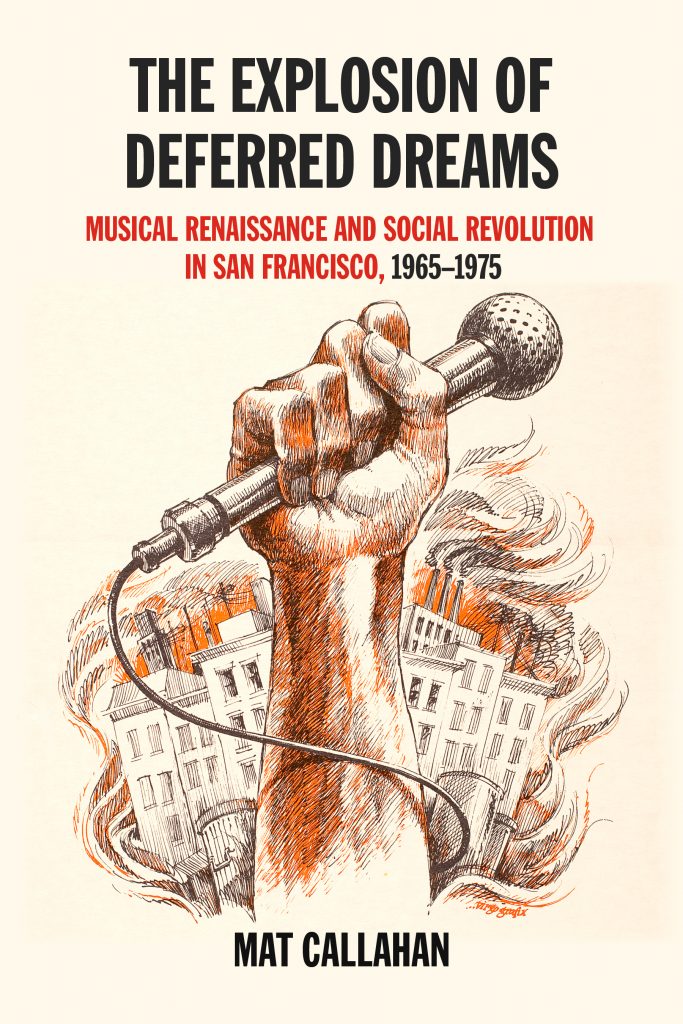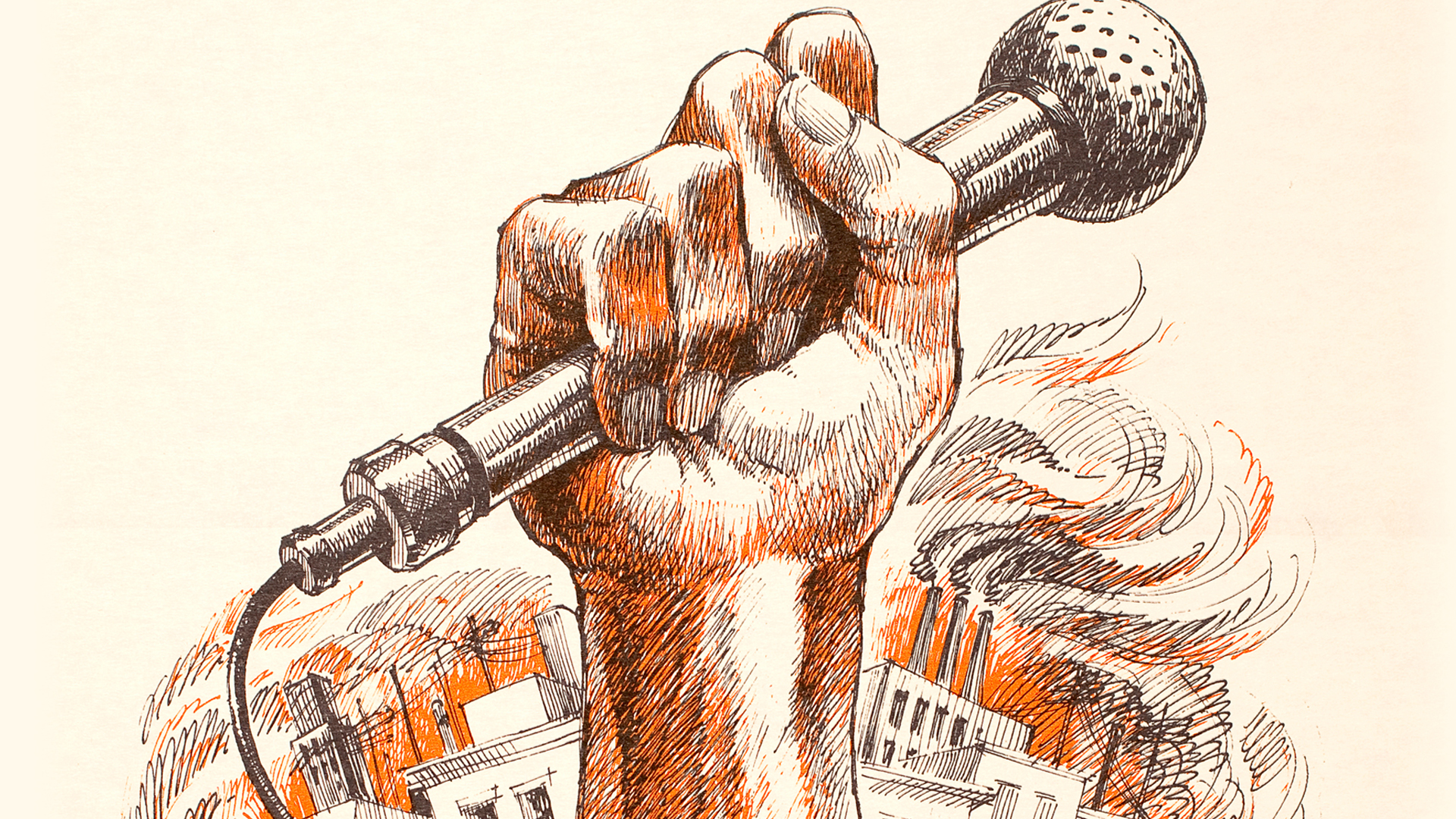
By Jessica Zimmer
The Potrero View
October 2018
Musician Mat Callahan was born in San Francisco in 1951, and lived on Arkansas Street, then Vermont Street, between 1969 and 1974. Callahan, who sings and plays electric and acoustic guitar, was a member of The Looters from the early-1980s to late-1990s. The rock band played throughout the City, including at The Fillmore and Bottom of the Hill.
Last year, Callahan published The Explosion of Deferred Dreams, a 308-page book about the connection between politics and music in the City that developed between 1965 and 1975. In the volume he explores ties between the United Farm Workers and Santana; and the Black Panthers and Sly and the Family Stone.
“The essential theme is that there was a musical renaissance of great significance that took place in the Bay Area during this decade. Simultaneously, there arose a worldview that revolution was not only desirable but imminent. In this book, I show that the wall between the two was erected after the fact,” said Callahan.
According to Callahan, Explosion is intended for general audiences as well as younger musicians interested in the 1960s and 1970s. He conducted more than 100 hours of interviews with 60 subjects to write the book, including Hill residents Ron Davis, an actor in the political street theater group the San Francisco Mime Troupe; and Joel Selvin, a former senior music reporter for the San Francisco Chronicle.
“1965 is the starting point. Following high points of the civil rights movement and the Free Speech movement, something new began in San Francisco. The arrest of Ron Davis at a performance of the San Francisco Mime Troupe in Lafayette Park (in August 1965) was a key moment leading to the fundraising appeals. Simultaneous with The Family Dog (a Pine Street hippie commune that arranged parties and events), people were organizing benefits and dance concerts. Bands like Jefferson Airplane joined Allen Ginsburg to defend radical street theater. The music and guerilla theater were performing in the streets, directly connected to the politics of civil rights and the growing anti-war movement. Later, you saw other key political events occur, the (1968) Third World Liberation Front strike at San Francisco State and the (1969) Occupation of Alcatraz,” said Callahan.
Callahan started the book as an essay in 2007, but kept on writing. “I got the idea around the time of the 40th anniversary of the Summer of Love. I felt a great falsehood had been perpetuated over the intervening years about what was going on in San Francisco in the Sixties,” he said.
According to Callahan, many histories of the time ignore the contributions of artists of color. “By 1969, there were more multiethnic bands like Santana and the Tower of Power. They were representative of a much broader constituency than college students listening to folk rock,” he said.
Callahan spent eight years writing the book, doing research online and in the Bay Area. He traveled several times from his now-home in Bern, Switzerland to Bay Area archives, including the San Francisco Public Library’s San Francisco History Center, the Bancroft Library at the University of California, Berkeley, and San Francisco State University’s Labor Archives and Research Center.
“I also worked with Lincoln Cushing, archival consultant of the “All of Us or None” collection of the Oakland Museum of California. Cushing provided a huge selection of posters from Michael Rossman’s social justice poster archive. The collection, which dates between 1964 and 2004, contains every single poster than hung on a wall or telephone pole. Cushing and I worked together to select a representative sample for Explosion,” said Callahan.
On October 27, from 4 to 5 p.m., Callahan will speak
about his book at the Potrero Branch library on 1616 20th Street. His
visit to the Hill was facilitated by local historian, Peter Linenthal, a
friend and former Lick Wilmerding High School classmate of Callahan.
“I
thought Mat’s research for the book was amazing. It brought back many
memories I’d forgotten, China Books in North Beach, for example, and how
Mao’s little red book was suddenly available there,” said Linenthal.
Oakland-based PM Press, which issued Callahan’s songbooks, published Explosion. According to Stephanie Pasvankias, PM Press publicist, Callahan has previously spoken about the book. “We worked with local historical groups and local papers to review the title and interview Mat specific to the (50th) anniversary (of the Summer of Love). (Last year), he came to the Bay Area and did a number of talks at local universities, bookstores, and events, like the Howard Zinn Book Fair,” said Pasvankias.
Pasvankias said the response to the book has been overwhelmingly positive. “Most folks have been surprised that this book exposed and reframed the political and social context for the San Francisco Sound and the vibrant subcultural uprisings with which it is associated. But have been appreciative of it,” said Pasvankias. Since its release 1,556 copies and 60 e-books of Explosion have sold.
Today, Callahan sings and plays guitar with his partner, singer Yvonne Moore, mostly in Europe. The duo has also toured the U.S. “We do a wide range of music. We’re presently working on a new project, “Working Class Heroes,” a CD and a songbook. This follows our “Songs of Freedom” project which commemorates James Connolly, the leader of Ireland’s 1916 Easter Rising. We put his songs to music and sang them,” said Callahan.
Callahan said Explosion exposes manipulation that should be avoided by those who fight “repressive regimes. During the 1960s and 1970s, there was a very powerful social movement that sought to change the world. The difficulties we’re faced with today are a result of the defeat of the revolution. Recent efforts like Occupy, the indigenous struggle against the pipelines, and Black Lives Matter are all indications of the willingness and desire of people to resist. All of these efforts still have not galvanized into something as powerful as the antiwar movement of the 1960s and 1970s,” he said.
Callahan believes the revolutionaries of those two decades made significant mistakes. “At the same time, some achievements were very important. Young people today can learn from reading a de-romanticized view of the era. They can use it for future generations,” he said.






